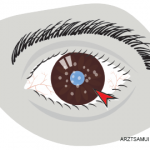NEW YORK (Reuters Health)—Mycophenolate sodium (MPS) is effective for treating children with chronic noninfectious uveitis, researchers from Germany report.
“Mycophenolate sodium could be used as a preferred steroid-sparing agent in children with chronic noninfectious intermediate uveitis,” Dr. Deshka Doycheva, from the University of Tuebingen, Germany, told Reuters Health by email.
MPS is an enteric-coated formulation of the sodium salt of mycophenolic acid whose derivative, mycophenolate mofetil (MMF), has also shown promise as a treatment for uveitis. MPS reduces the gastrointestinal side effects associated with MMF treatment.
Dr. Doycheva’s team assessed the efficacy and tolerability of MPS in a retrospective analysis of 23 children with chronic noninfectious uveitis treated with MPS.
In each case, MPS was initiated due to insufficient control of uveitis or side effects encountered during previous corticosteroid or immunosuppressive treatment.
The reactivation rate of uveitis decreased from 1.9 per year before treatment to 0.19 per year after MPS treatment. Five of 10 reactivations occurred during MPS dose reduction.
The probability of being free of uveitis reactivation after starting MPS was 65% at both one year and two years, according to the Nov. 13 British Journal of Ophthalmology online report. The median time on treatment before a reactivation was four months (range: 3–48 months).
Results were similar in the subset of 19 children with intermediate uveitis.
All patients were able to discontinue steroid eye drops while on MPS, and the probability of discontinuing systemic corticosteroids was 39% after one year of MPS treatment and 51% after two years of MPS treatment. Most children were able to decrease their daily maintenance dosage of corticosteroids to 0.1 mg/kg or less.
Visual acuity remained stable at six months and one year in 88% of eyes and worsened in only two eyes of two patients during follow up. Visual acuity improved in the other two eyes (two patients).
MPS treatment continued a median 24 months (range: 5–58 months). At the end of follow-up, 16 children continued to receive MPS, though the dose had been reduced to half of the recommended pediatric dose in four of these children.
Two children required MPS dose reductions because of nausea, but there were no discontinuations due to side effects.
“We are aware of the limitations of this nonrandomized clinical study, arising from its retrospective nature, the small patient number, the lack of standardized treatment regimen, and the variable period of follow up,” the researchers note. “However, this is the first study assessing the efficacy and tolerability of MPS in the therapy of uveitis of childhood.”


